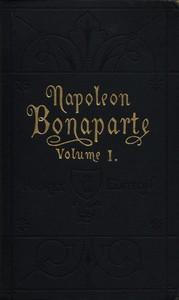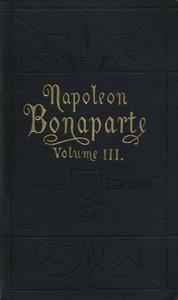Read this ebook for free! No credit card needed, absolutely nothing to pay.
Words: 194977 in 38 pages
This is an ebook sharing website. You can read the uploaded ebooks for free here. No credit cards needed, nothing to pay. If you want to own a digital copy of the ebook, or want to read offline with your favorite ebook-reader, then you can choose to buy and download the ebook.


: Life of Napoleon Bonaparte Volume I. by Scott Walter - Napoleon I Emperor of the French 1769-1821; France History 1789-1815
VIEW OF THE FRENCH REVOLUTION.
VIEW OF THE FRENCH REVOLUTION.
When we look back on past events, however important, it is difficult to recall the precise sensations with which we viewed them in their progress, and to recollect the fears, hopes, doubts, and difficulties, for which Time and the course of Fortune have formed a termination, so different probably from that which we had anticipated. When the rush of the inundation was before our eyes, and in our ears, we were scarce able to remember the state of things before its rage commenced, and when, subsequently, the deluge has subsided within the natural limits of the stream, it is still more difficult to recollect with precision the terrors it inspired when at its height. That which is present possesses such power over our senses and our imagination, that it requires no common effort to recall those sensations which expired with preceding events. Yet, to do this is the peculiar province of history, which will be written and read in vain, unless it can connect with its details an accurate idea of the impression which these produced on men's minds while they were yet in their transit. It is with this view that we attempt to resume the history of France and of Europe, at the conclusion of the American war--a period now only remembered by the more advanced part of the present generation.
The peace concluded at Versailles in 1783, was reasonably supposed to augur a long repose to Europe. The high and emulous tone assumed in former times by the rival nations, had been lowered and tamed by recent circumstances. England, under the guidance of a weak, at least a most unlucky administration, had purchased peace at the expense of her North American Empire, and the resignation of supremacy over her colonies; a loss great in itself, but exaggerated in the eyes of the nation, by the rending asunder of the ties of common descent, and exclusive commercial intercourse, and by a sense of the wars waged, and expenses encountered for the protection and advancement of the fair empire which England found herself obliged to surrender. The lustre of the British arms, so brilliant at the Peace of Fontainbleau, had been tarnished, if not extinguished. In spite of the gallant defence of Gibraltar, the general result of the war on land had been unfavourable to her military reputation; and notwithstanding the opportune and splendid victories of Rodney, the coasts of Britain had been insulted, and her fleets compelled to retire into port, while those of her combined enemies rode masters of the channel. The spirit of the country also had been lowered, by the unequal contest which had been sustained, and by the sense that her naval superiority was an object of invidious hatred to united Europe. This had been lately made manifest, by the armed alliance of the northern nations, which, though termed a neutrality, was, in fact, a league made to abate the pretensions of England to maritime supremacy. There are to be added to these disheartening and depressing circumstances, the decay of commerce during the long course of hostilities, with the want of credit and depression of the price of land, which are the usual consequences of a transition from war to peace, ere capital has regained its natural channel. All these things being considered, it appeared the manifest interest of England to husband her exhausted resources, and recruit her diminished wealth, by cultivating peace and tranquillity for a long course of time. William Pitt, never more distinguished than in his financial operations, was engaged in new modelling the revenue of the country, and adding to the return of the taxes, while he diminished their pressure. It could scarcely be supposed that any object of national ambition would have been permitted to disturb him in a task so necessary.
Neither had France, the natural rival of England, come off from the contest in such circumstances of triumph and advantage, as were likely to encourage her to a speedy renewal of the struggle. It is true, she had seen and contributed to the humiliation of her ancient enemy, but she had paid dearly for the gratification of her revenge, as nations and individuals are wont to do. Her finances, tampered with by successive sets of ministers, who looked no farther than to temporary expedients for carrying on the necessary expenses of government, now presented an alarming prospect; and it seemed as if the wildest and most enterprising ministers would hardly have dared, in their most sanguine moments, to have recommended either war itself, or any measures of which war might be the consequence.
Spain was in a like state of exhaustion. She had been hurried into the alliance against England, partly by the consequences of the family alliance betwixt her Bourbons and those of France, but still more by the eager and engrossing desire to possess herself once more of Gibraltar. The Castilian pride, long galled by beholding this important fortress in the hands of heretics and foreigners, highly applauded the war, which gave a chance of its recovery, and seconded, with all the power of the kingdom, the gigantic efforts made for that purpose. All these immense preparations, with the most formidable means of attack ever used on such an occasion, had totally failed, and the kingdom of Spain remained at once stunned and mortified by the failure, and broken down by the expenses of so huge an undertaking. An attack upon Algiers, in 1784-5, tended to exhaust the remains of her military ardour. Spain, therefore, relapsed into inactivity and repose, dispirited by the miscarriage of her favourite scheme, and possessing neither the means nor the audacity necessary to meditate its speedy renewal.
The acute historian whom we have already quoted seems to have apprehended, in the character and ambition of the northern potentates, those causes of disturbance which were not to be found in the western part of the European republic. But Catherine, the Semiramis of the north, had her views of extensive dominion chiefly turned towards her eastern and southern frontier, and the finances of her immense, but comparatively poor and unpeopled empire, were burdened with the expenses of a luxurious court, requiring at once to be gratified with the splendour of Asia and the refinements of Europe. The strength of her empire also, though immense, was unwieldy, and the empire had not been uniformly fortunate in its wars with the more prompt, though less numerous armies of the King of Prussia, her neighbour. Thus Russia, no less than other powers in Europe, appeared more desirous of reposing her gigantic strength, than of adventuring upon new and hazardous conquests. Even her views upon Turkey, which circumstances seemed to render more flattering than ever, she was contented to resign, in 1784, when only half accomplished; a pledge, not only that her thoughts were sincerely bent upon peace, but that she felt the necessity of resisting even the most tempting opportunities for resuming the course of victory which she had, four years before, pursued so successfully.
Frederick of Prussia himself, who had been so long, by dint of genius and talent, the animating soul of the political intrigues in Europe, had run too many risks, in the course of his adventurous and eventful reign, to be desirous of encountering new hazards in the extremity of life. His empire, extended as it was from the shores of the Baltic to the frontiers of Holland, consisted of various detached portions, which it required the aid of time to consolidate into a single kingdom. And, accustomed to study the signs of the times, it could not have escaped Frederick, that sentiments and feelings were afloat, connected with, and fostered by, the spirit of unlimited investigation, which he himself had termed philosophy, such as might soon call upon the sovereigns to arm in a common cause, and ought to prevent them, in the meanwhile, from wasting their strength in mutual struggles, and giving advantage to a common enemy.
Another and yet less justifiable cause of innovation, placed in peril, and left in doubt and discontent, some of the fairest provinces of the Austrian dominions, and those which the wisest of their princes had governed with peculiar tenderness and moderation. The Austrian Netherlands had been in a literal sense dismantled and left open to the first invader, by the demolition of the barrier fortresses; and it seems to have been the systematic purpose of the Emperor to eradicate and destroy that love and regard for their prince and his government, which in time of need proves the most effectual moral substitute for moats and ramparts. The history of the house of Burgundy bore witness on every page to the love of the Flemings for liberty, and the jealousy with which they have, from the earliest ages, watched the privileges they had obtained from their princes. Yet in that country, and amongst these people, Joseph carried on his measures of innovation with a hand so unsparing, as if he meant to bring the question of liberty or arbitrary power to a very brief and military decision betwixt him and his subjects.
His alterations were not in Flanders, as elsewhere, confined to the ecclesiastical state alone, although such innovations were peculiarly offensive to a people rigidly Catholic, but were extended through the most important parts of the civil government. Changes in the courts of justice were threatened--the great seal, which had hitherto remained with the chancellor of the States, was transferred to the Imperial minister--a Council of State, composed of commissioners nominated by the Emperor, was appointed to discharge the duties hitherto intrusted to a standing committee of the States of Brabant--their universities were altered and new-modelled--and their magistrates subjected to arbitrary arrests and sent to Vienna, instead of being tried in their own country and by their own laws. The Flemish people beheld these innovations with the sentiments natural to freemen, and not a little stimulated certainly by the scenes which had lately passed in North America, where, under circumstances of far less provocation, a large empire had emancipated itself from the mother country. The States remonstrated loudly, and refused submission to the decrees which encroached on their constitutional liberties, and at length arrayed a military force in support of their patriotic opposition.
Joseph, who at the same time he thus wantonly provoked the States and people of Flanders, had been seduced by Russia to join her ambitious plan upon Turkey, bent apparently before the storm he had excited, and for a time yielded to accommodation with his subjects of Flanders, renounced the most obnoxious of his new measures, and confirmed the privileges of the nation, at what was called the Joyous Entry. But this spirit of conciliation was only assumed for the purpose of deception; for so soon as he had assembled in Flanders what was deemed a sufficient armed force to sustain his despotic purposes, the Emperor threw off the mask, and, by the most violent acts of military force, endeavoured to overthrow the constitution he had agreed to observe, and to enforce the arbitrary measures which he had pretended to abandon. For a brief period of two years, Flanders remained in a state of suppressed, but deeply-founded and wide-extended discontent, watching for a moment favourable to freedom and to vengeance. It proved an ample store-house of combustibles, prompt to catch fire, as the flame now arising in France began to expand itself; nor can it be doubted, that the condition of the Flemish provinces, whether considered in a military or in a political light, was one of the principal causes of the subsequent success of the French Republican arms. Joseph himself, broken-hearted and dispirited, died in the very beginning of the troubles he had wantonly provoked. Desirous of fame as a legislator and a warrior, and certainly born with talents to acquire it, he left his arms dishonoured by the successes of the despised Turks, and his fair dominions of the Netherlands and of Hungary upon the very eve of insurrection. A lampoon, written upon the hospital for lunatics at Vienna, might be said to be no unjust epitaph for a monarch, one so hopeful and so beloved--"Josephus, ubique Secundus, hic Primus."
These Flemish disturbances might be regarded as symptoms of the new opinions which were tacitly gaining ground in Europe, and which preceded the grand explosion, as slight shocks of an earthquake usually announce the approach of its general convulsion. The like may be said of the short-lived Dutch revolution of 1787, in which the ancient faction of Louvestein, under the encouragement of France, for a time completely triumphed over that of the Stadtholder, deposed him from his hereditary command of Captain-General of the Army of the States, and reduced, or endeavoured to reduce, the confederation of the United States to a pure democracy. This was also a strong sign of the times; for, although totally opposite to the inclination of the majority of the States-General, of the equestrian body, of the landed proprietors, nay, of the very populace, most of whom were from habit and principle attached to the House of Orange, the burghers of the large towns drove on the work of revolution with such warmth of zeal and promptitude of action, as showed a great part of the middling classes to be deeply tinctured with the desire of gaining further liberty, and a larger share in the legislation and administration of the country, than pertained to them under the old oligarchical constitution.
Free books android app tbrJar TBR JAR Read Free books online gutenberg
More posts by @FreeBooks

: Marianela by P Rez Gald S Benito Bell Clara Translator - Spanish fiction Translations into English








